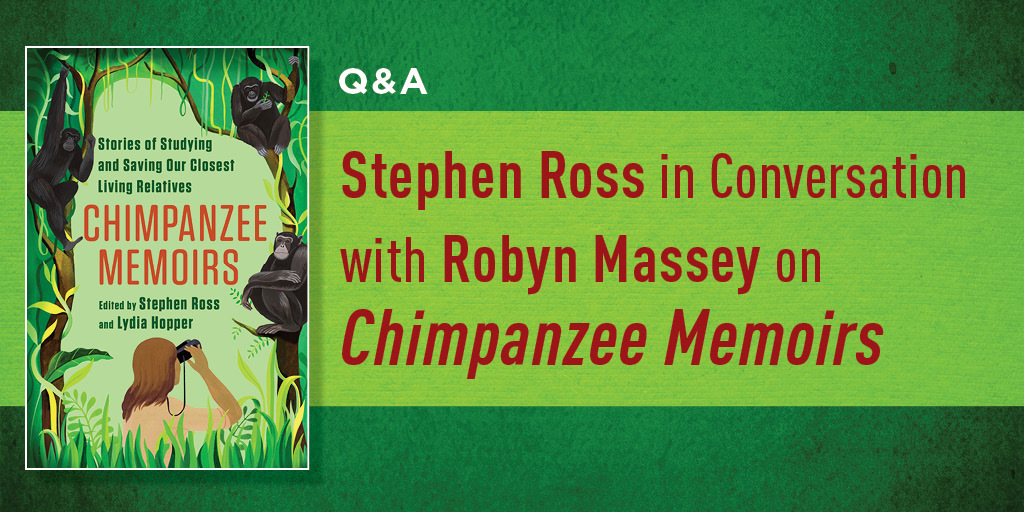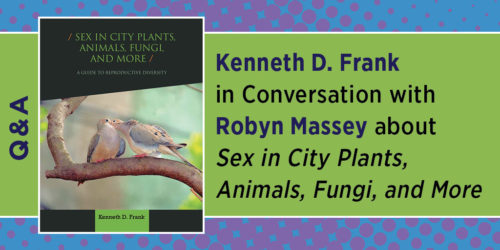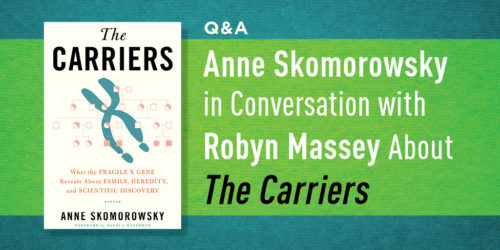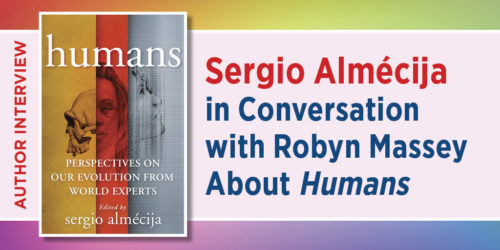Stephen Ross in Conversation with Robyn Massey on Chimpanzee Memoirs

Chimpanzees fascinate people for many reasons. The apes’ resemblance to humanity, as seen in their use of tools and their complex social lives, can awe us. But what moves someone to dedicate their lives to chimpanzees? In this conversation, Stephen Ross, coeditor of Chimpanzee Memoirs: Stories of Studying and Saving Our Closest Living Relatives, opens up to Robyn Massey about his interest in chimpanzees, why he thinks they fascinate the general public, and offers insight about the book.
Robyn Massey: What drew you to this project? What draws you to the topic of chimpanzees?
Stephen Ross: I have studied chimpanzees for about twenty-five years now and have been fascinated by them since childhood. I am very fortunate to have fulfilled my childhood dream of working with chimpanzees, but so often I get asked about how I came into this field of work. One of the inspirations for this collection of essays is an appreciation for being part of this amazing and diverse community of people who have dedicated their lives to studying and protecting our sister species. There are many books about chimpanzees, but, outside of what the public knows about Jane Goodall’s story, there is very little written about what has inspired a whole range of other people to work with chimpanzees. Additionally, so many prominent chimpanzee scientists are reaching the end of their careers and I really wanted to capture their stories and their reflections on their lives with chimpanzees.
Massey: Where are chimpanzees in the wild most prevalent today? How about chimpanzees under care? Where are they most prevalent, and is there any such thing as a chimpanzee in the wild? Why or why not?
Ross: Chimpanzees are found across the middle swath of Africa, from the westernmost countries on the Atlantic coast as far east as Tanzania. Estimates of wild populations vary, but there are likely not more than 150,000 left in the wild, which is a tragic decline from a population that likely was over 1 million within the last century. In terms of chimpanzees in managed settings, the United States has the most, at around 1,300, but that population is also much smaller than just a couple decades ago when chimpanzees were more prevalent in biomedical research laboratories and bred to combat human diseases such as hepatitis and HIV/AIDS. Today most of the chimpanzees in the United States are housed in sanctuaries where they are retired from lives as research subjects, pets, or performers.
Massey: What is the difference between chimpanzees and monkeys?
Ross: Chimpanzees are apes . . . great apes in fact . . . which means they do not have tails like monkeys. Chimpanzees, as well as gorillas, orangutans, bonobos, and humans, are also quite a bit larger than smaller-bodied monkeys.
Massey: Why do you suppose chimpanzees are in the news so much, possibly more than any other animal, save for dogs and cats?
Ross: Chimpanzees have long been fascinating to the general public, in part because they have traditionally been involved in so many aspects of our lives. Unlike gorillas, they are in the public eye because they have been unfortunately used in the media for so long. But also that fascination, I think, comes from the manner in which we are so similar to them. When you look at a chimpanzee, it’s almost impossible not to immediately recognize and relate to the many physical similarities we share . . . but then the cognitive and emotional aspects are so compelling as well, and so many of these authors in the book have really substantially contributed to our understanding of exactly how similar we all are to chimpanzees.
Massey: Tell us about the illustrations in the book. Who are the chimpanzees that are featured, and who did the illustrating?
Ross: As the book was coming together, Lydia [Hopper] (my coeditor) and I recognized the need to highlight the importance of specific individual chimpanzees to our authors. So many of their stories featured particular chimpanzees with specific personalities that inspired them, so we wanted to highlight that somehow in the book with some portraits. I was talking with my supervisor one day and noticed a beautiful pencil sketch of a lion on her desk, and when I asked who drew it she told me about Dawn Schuerman, who was working in the nutrition center at the Lincoln Park Zoo. Her job was to prepare the meals for the various animals around the zoo, but she is also a very talented artist, and so I asked if she would be willing to contract her talents to prepare these individual drawings for us. We gathered photographs from our authors, and she turned them into these amazing pieces of art.
Massey: What would you most like people to know?
Ross: We wrote this book to show how seemingly ordinary people from all walks of life and places in the world have become inspired to dedicate their lives to our closest living relatives, the chimpanzee. I think often a career in science is seen as drab and monotonous so to hold up these examples of inspiring people doing inspiring things was a real joy. Of course, Jane Goodall is featured in the first chapter of the book, but everything following is made up of stories from those that came after her. To see the diversity of stories and people that have this connection with chimpanzees is really inspiring.
Massey: Are there any lessons, as humans, that we might learn from chimpanzees?
Ross: The book is full of these life lessons that the various authors have gleaned from chimpanzees. Everything from exercising patience to being a good parent. The lessons may be familiar to many of us, but to hear them told in the context of a completely different species may be a new perspective for folks.
Massey: What is it you wish to say to the science community [or to primatologists]?
Ross: This is a book about scientists much more than a book for scientists. A certain amazing thing is that stories about nonhumans (chimpanzees) can make us all learn more about ourselves as humans. And if this book contributes to someone deciding to take on a lifetime pursuit to save a species, or study animals, then I think we will be very pleased.








